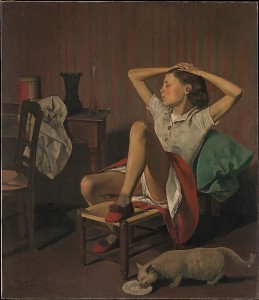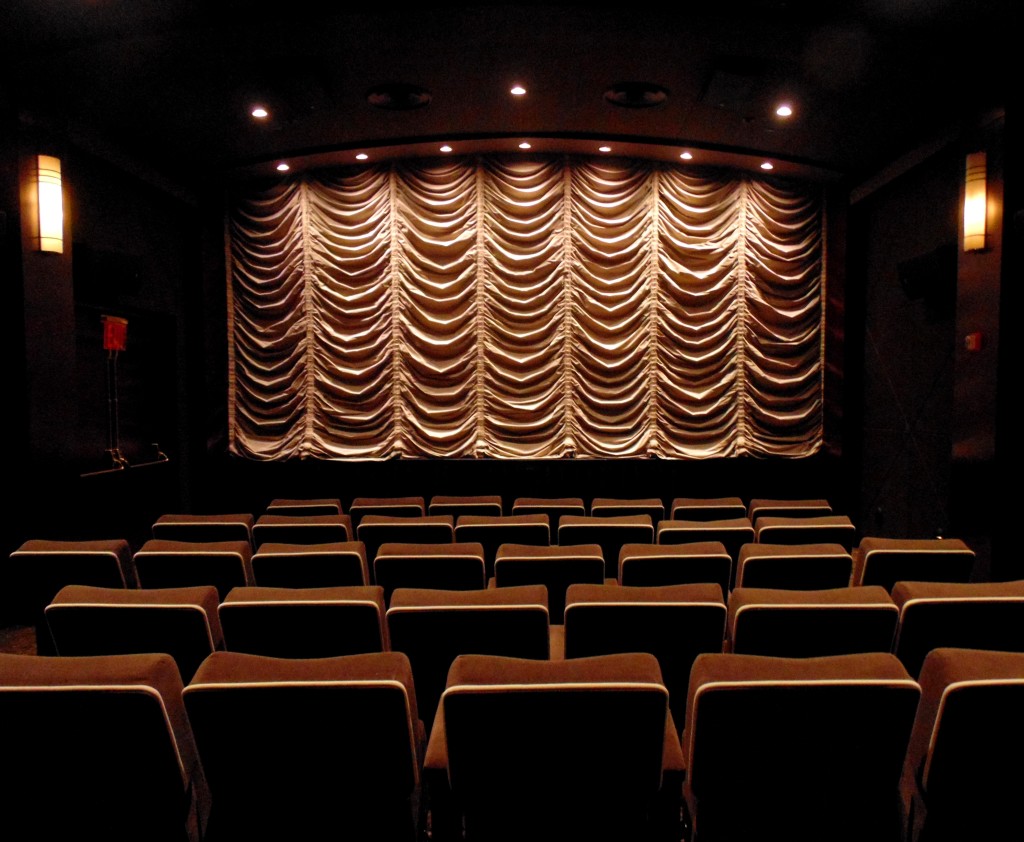“When you really come up with some new, fresh ideas, a lot of people get frightened. And who could blame them? I’m the GM of a station, making a shit-ton of dough, and here comes this asshole who tells me how to do radio. I remember at WNBC, this guy wanted us to change the news so that Robin and I would sound like the rest. We had the highest ratings of the whole station. I was like, ‘Why don’t you change your news to be like ours?’ It didn’t make any sense to me. When you’re coming up with something new, it’s threatening. It really is. And some people in business fear success. They’re comfortable where they are, not wanting to cause too many waves.”
Author Archives: BobHill
Equal Justice, Equal Opportunity, Equal Dignity
Click through for full-size gallery.
Film Capsule: Visitors
Watching Visitors feels like going to mass. It’s slow and it’s boring, and it lingers on too long. But if you can somehow suffer through it, you just might connect to what’s not being said.
(Visitors premieres at the Landmark Sunshine Cinema in New York City this Friday.)
The Balcony Is Closed
Film Capsule: Big Bad Wolves
Ever heard somebody say, “Yo, man, that movie really fucked me up.”? Yes? No? Well, anyway, Big Bad Wolves will fuck you up, and I mean that in the best possible way. Assuming you’re not easily distracted by subtitles and you’re the type that gets off on peeking through veiled fingers, Big Bad Wolves‘ll skin ya good. The movie, an Israeli suspense thriller, peels back like an onion, forcing an increased emotional response the deeper – and more pungent – it gets.
Written and directed by award-winning filmmaker Aharon Keshales, Wolves comes masquerading as a morality play – cerebral enough to achieve obfuscation, fast and loose enough to provide an occasional laugh. Tzahi Grad is Oscar-worthy, as is the screenplay, brimming with indictment. The climax lingers on, but only after it’s achieved heart-pounding impact, the tension tuned so high that one could pluck it like a wire. Keshales does just that, time and time again, which is why Big Bad Wolves will fuck you up, and I mean that in the fiercest way.
(Big Bad Wolves arrives in limited release this Friday.)
A Brief History of Russell Crowe Selecting Roles That Allow Him to Be Right While The Entire World Goes Wrong
Two-and-a-half months from now Paramount Pictures will release Noah, a modern retelling of the Old Testament flood story originally related via Genesis. Darren Aronofsky’s version will offer a feast for the eyes, all CGI grandeur and Clint Mansell score. What will remain mostly the same, however, is the assertion that Noah, a 600-year old patriarch (ala Yoda), maintained some telepathic link to God. God, eager for upheaval, imposed upon Noah to “make an ark,” thereby rendering the long-time artisan a kook. Following the deluge of mankind, Noah was proven a survivor – the unsung savior of our ecosystem.
Historically speaking, characters like Noah represent what’s known as Classic Crowe Bait – domineering reflections of an actor viewed as martyr. For years, the majority of Hollywood has regarded Russell Crowe as a brilliant-yet-intolerable phenom, a blowhard who spent the early aughts engaged in volatility. Through it all, Crowe’s irrepressible conceit has shone through, very often via the roles he’s chosen to pursue.
To wit (a chronological breakdown):
10 Major Cities That Love IFearBrooklyn (& That IFearBrooklyn Loves Right Back)
Was Denis Villeneuve’s ‘Prisoners’ Actually an Indictment of God as The Root of All Evil?
The primary conflict that arises when one hinges his entire existence upon God – or any faith-based ideology, for that matter – is that God accepts the blessing, while man assumes the blame. I mean, there’s more, of course, including an ongoing lack of accountability and stiff reluctance to rely on foolproof science. But in the end it all circles back to unrequitement, and unrequitement’s stern ability to breed contempt.
This is the dynamic Canadian director Denis Villeneuve chose to explore during his 2013 drama, Prisoners … a movie throughout which God – and by extension, organized religion – keeps clawing at the surface. During the first three minutes alone, viewers are confronted with one crucifix, talk of the Rapture, the Gene MacLellan classic “Put Your Hand In The Hand (Of the Man from Galilee)“, and, most importantly, the “Our Father” (offered as a ritual prior to the killing of an innocent).
That’s an awful lot of subtext for a little bit of sequence. And yet, Villeneuve proves so expert about inserting it, one tends to overlook the symbolism entirely. Aaron Guzikowski’s adapted screenplay, meanwhile, reveals God – or even godlessness – via the arc of several characters. Consider the following, by way of example:
James Toback on Movie Vs. Documentary (2013)
“I think anyone who today still feels that fiction films are competitive in terms of depicting the human condition with documentary – all other things being equal in terms of quality – has his head lodged so firmly up his colon that he should find a crane to remove it. This almost gruesomely embarrassing talk about digging deep into one’s so-called soul to get performances of truth, moments of truth, in fiction films, and brave performances … I always think of coal miners when people talk about brave performances. What bravery does it take? I mean, it’s not happening, it’s not real. And if the goal of documentary moviemaking is to show some form of truth – and if you’re dealing with people, psychological truth, personal truth, emotional truth – it’s something you’re never getting more than a glimpse of in a fiction film. I still like movies, and I want to make some of them, but I think every year it becomes more and more apparent that it’s embarrassing to compare the two. The documentary has advanced so far beyond, and the movies that are of interest are numerically so heavily weighted in the favor of documentary, despite the fact that 99% of the money is spent making fiction films, most of which are not worth watching. We’re in this sluggish environment in which still that’s where all the attention is paid, or most of the attention, most of the emphasis. And there’s this world of fascinating, terrific stuff that’s being made all the time, in the theaters, on the television. I could spend my life just watching one interesting
nonfiction film after another.”
Galleria: Balthus: Cats & Girls @ The Metropolitan Museum of Art
 It’s a funny thing about the French painter Balthus, in that he nearly gave up his budding career out of frustration. When Balthus reemerged at the age of 25, he focused almost entirely on portraits – lurid, filthy, decadent portraits. His favorite subject, perhaps even his muse, was a prepubescent neighbor by the name of Therese Blanchard. Blanchard (illustration at right) posed for nearly a dozen well-known Balthus paintings, all of them between the years of 1936 and ’39 (at which point Balthus got called up for military duty). After the war, Therese Blanchard – who was now teetering on the brink of adulthood – disappeared from Balthus’ work entirely.
It’s a funny thing about the French painter Balthus, in that he nearly gave up his budding career out of frustration. When Balthus reemerged at the age of 25, he focused almost entirely on portraits – lurid, filthy, decadent portraits. His favorite subject, perhaps even his muse, was a prepubescent neighbor by the name of Therese Blanchard. Blanchard (illustration at right) posed for nearly a dozen well-known Balthus paintings, all of them between the years of 1936 and ’39 (at which point Balthus got called up for military duty). After the war, Therese Blanchard – who was now teetering on the brink of adulthood – disappeared from Balthus’ work entirely.
By 1950, Balthus had become an international sensation, his work championed by the likes of Matisse and Fellini. Therese Blanchard, on the other hand, was dead … plucked at the very same age as Balthus when he originally began painting her. Perhaps this is one of several reasons why visitors feel inextricably drawn to the “Therese” gallery of Cats & Girls. For it is inside this gallery, much more than any other, that one gets a sense of both the exploitation and the provocation that still render Balthus’ work worthwhile.
(Balthus: Cats & Girls continues at The Metropolitan Museum of Art through this Sunday, January 12th. Free with suggested donation.)
Five More For The Offing:
- Be Fabulous by Roxanne Lowit @ Steven Kasher Gallery (Free, through 1/12, 521 West 23rd Street)
- The Last Studies by Balthus @ Gagosian Gallery (Free, through 1/18, 976 Madison Avenue)
- American Legends: From Calder to O’Keefe featuring various artists @ The Whitney Museum ($20 general admission, through 10/19, 945 Madison Avenue @ 75th Street)
- The Mystery of The Ordinary by Magritte @ The Museum of Modern Art ($25 general admission, through 1/12, 11 West 53rd Street)
- The Image Gallery Redux featuring various artists @ Howard Greenberg Gallery (Free, 1/9-2/15, 41 East 57th Street, Suite 1406)


